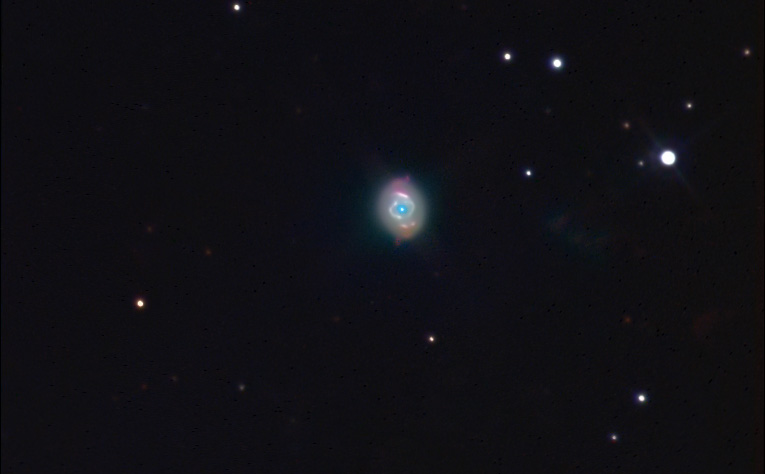|
A planetary nebula of most unusual coloration, this very high surface brightness object is 8.8 magnitude and 20 arcseconds (yes arcseconds) in size. The very blue central star is a beacon at 11.1 magnitude. Look closely at the unusual structure seen here. Polar "jets" of material, red here are seen at about 12:30 and 6:30. Light colored internal arcs are around the central star, and pink and yellow colored spots are on the vertexes of the long axis of the object. Yes thats a galaxy off to the right, blue with a hint of a single pink HII region, this is16th magnitude IC4677. This object is shot with a barlow lens to yield f/9, similar in focal length to many of the R/C optical systems many are doing CCD work with today. Faint diffraction spikes can be seen extending from such a brilliant object in this image as well. My diagonal vanes are rotated 45 degrees from most newtonians due to a square tube. Processing: Photoshop curves and luminance layering were used to preserve the extreme range of brightness and deep coloration of this object. Instrument: 12.5" f/5 Home made Newtonian with 2" Barlow Platform: Astrophysics 1200 QMD CCD Camera: SBIG ST7E w/Enhanced Cooling Exposure: LRGB = 60:20:20:20 (Synthetic Luminance) RGB Combine Ratio: 1: .95: 1.8 Filters: RGB Tricolor Location: Payson, Arizona Elevation: 5150 ft. Sky: Seeing FMHW = 2.3 arcsec, Transparency 8/10 Outside Temperature: 15 C CCD Temperature: -20 C Processing: Maxim DL, Photoshop, AIP4WIN, PW Pro.
|
||
|
|
||
|
FastCounter by bCentral |
